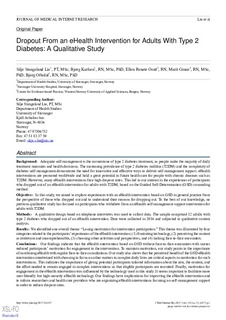| dc.contributor.author | Lie, Silje Stangeland | |
| dc.contributor.author | Karlsen, Bjørg | |
| dc.contributor.author | Oord, Ellen Renate | |
| dc.contributor.author | Graue, Marit | |
| dc.contributor.author | Oftedal, Bjørg Frøysland | |
| dc.date.accessioned | 2018-01-10T09:11:04Z | |
| dc.date.available | 2018-01-10T09:11:04Z | |
| dc.date.created | 2017-06-05T11:28:47Z | |
| dc.date.issued | 2017-05 | |
| dc.identifier.citation | Lie, S.S. et al. (2017) Dropout From an eHealth Intervention for Adults With Type 2 Diabetes: A Qualitative Study. Journal of Medical Internet Research, 19(5), | nb_NO |
| dc.identifier.issn | 1438-8871 | |
| dc.identifier.uri | http://hdl.handle.net/11250/2476585 | |
| dc.description | Originally published in the Journal of Medical Internet Research (http://www.jmir.org), 30.05.2017. This is an open-access article distributed under the terms of the Creative Commons Attribution License (https://creativecommons.org/licenses/by/4.0/). | nb_NO |
| dc.description.abstract | Background: Adequate self-management is the cornerstone of type 2 diabetes treatment, as people make the majority of daily treatment measures and health decisions. The increasing prevalence of type 2 diabetes mellitus (T2DM) and the complexity of diabetes self-management demonstrate the need for innovative and effective ways to deliver self-management support. eHealth interventions are promoted worldwide and hold a great potential in future health care for people with chronic diseases such as T2DM. However, many eHealth interventions face high dropout rates. This led to our interest in the experiences of participants who dropped out of an eHealth intervention for adults with T2DM, based on the Guided Self-Determination (GSD) counseling method.
Objective: In this study, we aimed to explore experiences with an eHealth intervention based on GSD in general practice from the perspective of those who dropped out and to understand their reasons for dropping out. To the best of our knowledge, no previous qualitative study has focused on participants who withdrew from an eHealth self-management support intervention for adults with T2DM.
Methods: A qualitative design based on telephone interviews was used to collect data. The sample comprised 12 adults with type 2 diabetes who dropped out of an eHealth intervention. Data were collected in 2016 and subjected to qualitative content analysis.
Results: We identified one overall theme: “Losing motivation for intervention participation.” This theme was illustrated by four categories related to the participants’ experiences of the eHealth intervention: (1) frustrating technology, (2) perceiving the content as irrelevant and incomprehensible, (3) choosing other activities and perspectives, and (4) lacking face-to-face encounters.
Conclusions: Our findings indicate that the eHealth intervention based on GSD without face-to-face encounters with nurses reduced participants’ motivation for engagement in the intervention. To maintain motivation, our study points to the importance of combining eHealth with regular face-to-face consultations. Our study also shows that the perceived benefit of the GSD eHealth intervention intertwined with choosing to focus on other matters in complex daily lives are critical aspects in motivation for such interventions. This indicates the importance of giving potential participants tailored information about the aim, the content, and the effort needed to remain engaged in complex interventions so that eligible participants are recruited. Finally, motivation for engagement in the eHealth intervention was influenced by the technology used in this study. It seems important to facilitate more user-friendly but high-security eHealth technology. Our findings have implications for improving the eHealth intervention and to inform researchers and health care providers who are organizing eHealth interventions focusing on self-management support in order to reduce dropout rates. | nb_NO |
| dc.language.iso | eng | nb_NO |
| dc.publisher | JMIR Publications | nb_NO |
| dc.rights | Navngivelse 4.0 Internasjonal | * |
| dc.rights.uri | http://creativecommons.org/licenses/by/4.0/deed.no | * |
| dc.subject | diabetes | nb_NO |
| dc.subject | diabetes type 2 | nb_NO |
| dc.subject | type 2 diabetes | nb_NO |
| dc.subject | diabetes mellitus | nb_NO |
| dc.subject | counseling | nb_NO |
| dc.subject | self-management | nb_NO |
| dc.title | Dropout From an eHealth Intervention for Adults With Type 2 Diabetes: A Qualitative Study | nb_NO |
| dc.type | Journal article | nb_NO |
| dc.type | Peer reviewed | nb_NO |
| dc.description.version | publishedVersion | nb_NO |
| dc.rights.holder | © Silje Stangeland Lie, Bjørg Karlsen, Ellen Renate Oord, Marit Graue, Bjørg Oftedal | nb_NO |
| dc.subject.nsi | VDP::Medical disciplines: 700::Clinical medical disciplines: 750::Endocrinology: 774 | nb_NO |
| dc.source.volume | 19 | nb_NO |
| dc.source.journal | Journal of Medical Internet Research | nb_NO |
| dc.source.issue | 5 | nb_NO |
| dc.identifier.doi | 10.2196/jmir.7479 | |
| dc.identifier.cristin | 1474056 | |
| dc.relation.project | Norges forskningsråd: 231065 | nb_NO |
| cristin.unitcode | 217,7,2,0 | |
| cristin.unitname | Institutt for helsefag | |
| cristin.ispublished | true | |
| cristin.fulltext | original | |
| cristin.qualitycode | 2 | |

